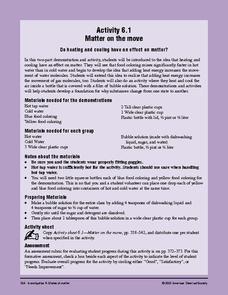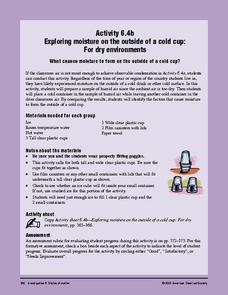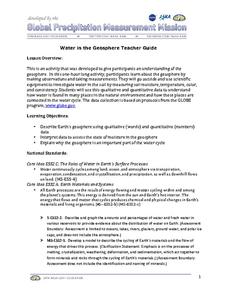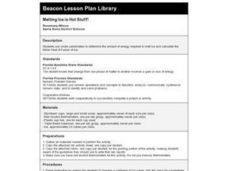Curated OER
Physical Changes and States of Matter - Two
Here's a wonderful lesson on how substances change states. Groups of learners are given trays with a chocolate bar, a piece of paper, an ice cube, and a balloon. During the activity, the groups closely observe the changes that each...
Center for Learning in Action
Introduction to Matter
Begin your states of matter lessons with a demonstration designed to introduce the concept that all matter has properties. Reinforce this concept through vocabulary exploration, and the creation of atom models; salt, water, and carbon...
Curated OER
What's the Matter?
Students explore the components of matter. They discover what matter is, the states of matter, and how heat and cold cause it to change states in an online format. In addition, they complete internet-based lessons, activities, and quizzes.
Curated OER
Mixing It Up!
Third graders identify the different states of matter. In this science lesson, 3rd graders describe the different components of solutions and mixtures. They create emulsions, foams and suspensions in the lab.
American Chemical Society
Matter on the Move
Start this mini unit on matter out by demonstrating how food coloring behaves when placed in cold and in hot water. Then have the class experiment with warm water and soap film. Pupils will learn that an increase in thermal energy also...
Curated OER
What's the Matter?
Young scholars explore matter. In this matter and technology lesson, students locate examples of solids, liquids, and gases inside and outside the classroom, and record their findings in a graphic organizer. Young scholars listen to...
Curated OER
What's The Scoop?
Students explore the properties of matter. In this cross curriculum three states of matter science lesson, students listen to the poem "Eighteen Flavors" by Shel Silverstein, and predict what will happen if listed ingredients are...
Curated OER
What is Matter?
Students investigate what matter is and how it changes states. In this physical properties instructional activity, students examine the vocabulary database and identify the characteristics of the three phases of matter. Students...
Baylor College
Moving Air
In lab groups, young scientists place aluminum cans with a bubble-solution cap into different temperatures of water to see what size of bubble dome forms. As part of an atmosphere unit in preparation for learning about convection...
Cornell University
Chemical Reactions
Investigate the Law of Conservation of Mass through a lab exploration. Individuals combine materials to initiate chemical reactions. They monitor for signs of reactions and measure the masses before and after the reactions for comparison.
American Chemical Society
Exploring Moisture on the Outside of a Cold Cup: For Dry Environments
If the area you live in is arid, or the preceding experiment in this unit didn't yield obvious results, use this one in place of it to help reveal where condensation comes from. The mini unit that this is part of a comprehensive...
American Chemical Society
Exploring Moisture on the Outside of a Cold Cup
As a stand-alone or as part of the intended unit, this is a valid investigation of what causes condensation to occur. By limiting the amount of air around a cold cup of water and comparing it to one out in the open, they find that the...
Baylor College
What Is the Water Cycle?
Small groups place sand and ice in a covered box, place the box in the sunlight, then observe as evaporation, condensation, and precipitation occur. These models serve as miniature water cycles and demonstrations of the three phases of...
PBS
Breaking it Down
After challenging themselves to correctly choose the form of erosion and length of time required for a given landform to develop, earth science class members model mechanical and chemical weathering with various lab demonstrations over...
Curated OER
Introduction to Gases
Students are introduced to gases. For this science lesson plan, students demonstrate that gases are a state of matter, generate a number of gases, discover some properties of gases, compare some of the properties of different gases, and...
Curated OER
Solid, Liquid or Gas?
Students explore solid, liquids, and gases. In this science lesson plan, students distinguish similarities and differences of matter and recognize that different states of matter may appear in one substance.
Curated OER
Air Pressure
Learners participate in a series of demonstrations about Bernoulli's principle. They explain how air pressure varies with air speed. They write a detailed lab report about the activity. This is a great way to explore this concept.
Curated OER
Map Skills
Students create two types of maps. In this map skills instructional activity, students discuss map vocabulary and view maps of Florida. Students draw a free hand map of Florida and include major cities, bodies of water and land forms. ...
American Chemical Society
From Gas to Liquid to Solid
From gas to liquid condensation to solid frost, water undergoes phase changes before young scholars' eyes! Using ice, salt, water, and a metal can, they set up an investigation that can be used in a physical science setting, or as part...
American Chemical Society
Condensation
It's time to break the ice! If you are doing all of the lessons in the unit, children have already seen that increasing heat increases the rate of evaporation, but is the opposite true? Does decreasing temperature cause more condensation...
American Chemical Society
Evaporation
This is one in several lessons that explore the relationship between temperature and phase changes of water. After some discussion, elementary physical scientists place wet paper toweling on a hot and a room-temperature water bag and...
Curated OER
Water in the Geosphere
Through a PowerPoint presentation and the embedded animation and video, earth science enthusiasts find out about the moisture in the soil beneath our feet. In the animation, follow a water molecule on its path through the water cycle. As...
Curated OER
Scientific Method Experiment: Factors Affecting How Ice Melts
Students demonstrate the scientific method by conducting an ice cube melting experiment. They make predictions and observations, and conclude what factors make ice melt more slowly or quickly than normal.
Curated OER
Melting Ice is Hot Stuff!
Fourth graders determine the amount of energy required to melt ice using a calorimeter. They calculate the Molar Heat of Fusion of Ice.

























